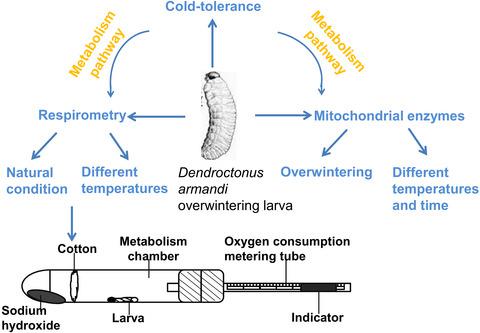当前位置:
X-MOL 学术
›
Entomol. Exp. Appl.
›
论文详情
Our official English website, www.x-mol.net, welcomes your
feedback! (Note: you will need to create a separate account there.)
Effects of cold stress on metabolic regulation in the overwintering larvae of the Chinese white pine beetle, Dendroctonus armandi
Entomologia Experimentalis et Applicata ( IF 1.4 ) Pub Date : 2020-11-01 , DOI: 10.1111/eea.12991 Danyang Fu 1 , Lulu Dai 1 , Hang Ning 1 , Xiaotong Kang 1 , Yaya Sun 1 , Hui Chen 1, 2
Entomologia Experimentalis et Applicata ( IF 1.4 ) Pub Date : 2020-11-01 , DOI: 10.1111/eea.12991 Danyang Fu 1 , Lulu Dai 1 , Hang Ning 1 , Xiaotong Kang 1 , Yaya Sun 1 , Hui Chen 1, 2
Affiliation

|
The Chinese white pine beetle, Dendroctonus armandi Tsai & Li (Coleoptera: Curculionidae, Scolytinae), is considered the most destructive forest pest in the Qinling and Bashan Mountains of China. In recent years, winter temperature has dropped in these regions, and extremely low temperatures are hard to survive for insects. Cold hardiness becomes a crucial strategy because temperature change often leads to fluctuations in insect abundance, and the metabolism rate is a key index of resistance to cold in overwintering insects. Therefore, we investigated the relationship between the change in respiratory rate and the activity of metabolism‐related mitochondrial enzymes in D. armandi larvae under cold conditions. We found that the respiratory rate decreased, and it was matched with the activity of glutamate dehydrogenase, aconitase, and lipase during overwintering. Among the various test times under cold conditions, the respiratory rate also decreased with decreasing temperature and increased under very low temperatures. At all cold stress periods, glutamate dehydrogenase and lipase showed increased activity at higher temperatures and decreased activity under lower temperatures, but the activity of NAD‐malic enzyme, NADP‐malic enzyme, mitochondrial isocitrate dehydrogenase, and aconitase were contrary. Under all low temperatures, the activity of enzymes – except for NADP‐malic enzyme, glutamate dehydrogenase, and lipase – increased in short‐term cold stress and decreased in long‐term cold stress at 4, 0, −4, −6, −8, and −10 °C. However, at −2 °C, the activity of enzymes showed a decreasing trend in short‐term treatments and an increasing trend in long‐term treatments, except for mitochondrial isocitrate dehydrogenase. The results not only improve our understanding of the metabolic mechanism of cold adaptation in D. armandi, but also provide an important experimental basis for further study and biological pest control.
更新日期:2020-11-01











































 京公网安备 11010802027423号
京公网安备 11010802027423号